Religion significantly influences Filipino values and morality. It combines traditional practices and spiritual beliefs, emphasizing family, respect, and community.
For instance, the concept of kapwa promotes interconnectedness among people, recognizing that an individual's actions affect others. This cultural blend is reflected in festivals, which merge indigenous rites with Catholic traditions.
In the Philippines, Catholicism is the dominant religion, shaping the country's moral fabric. However, emerging sects and younger generations are reevaluating traditional norms, leading to a shift in moral perspectives.
This evolution is crucial in understanding the dynamic relationships between religion, personal behavior, and societal values.
Understanding these relationships is key to grasping the evolving Filipino identity. By examining the diverse religious landscape, we can uncover how religious beliefs and practices influence individual behavior and societal norms.
Historical Overview of Religion
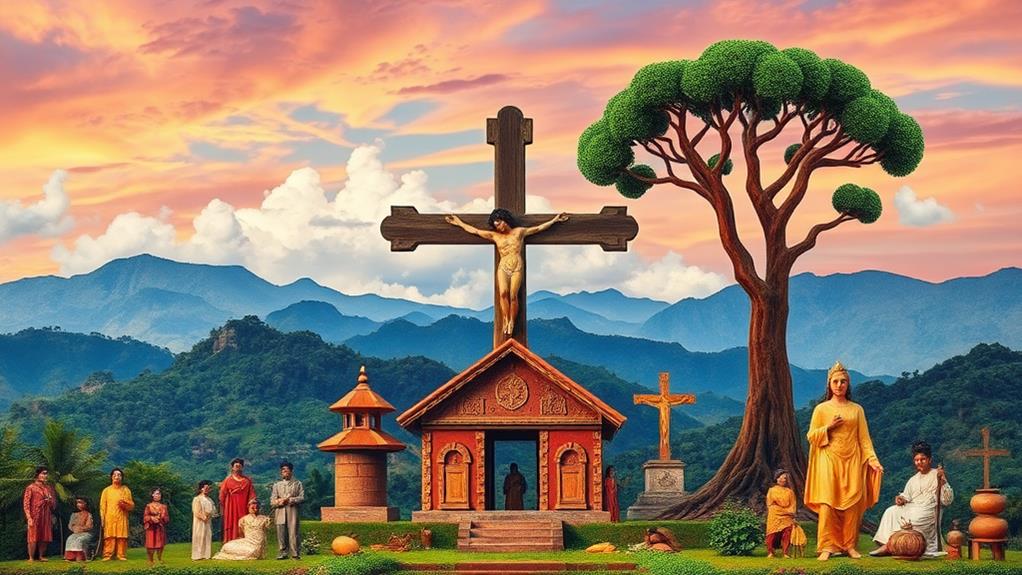
The Philippines has a rich history of diverse religious beliefs and practices. Pre-Hispanic Filipinos worshipped a pantheon of gods, led by Bathala as the supreme deity, and relied on shamans for spiritual guidance. This early religious landscape was altered by the arrival of Islam around 1350, particularly in Mindanao and Sulu, where it established complex political structures that thrived before the Spanish colonization in 1565.
The Spanish imposition of Catholicism in 1565 marked a pivotal moment in the country's religious landscape, transforming it into the dominant faith, especially in rural areas. The blending of folk Christianity with indigenous beliefs created a unique spiritual identity, fostering a culture rich in traditions and rituals.
For example, the Sinulog Festival in Cebu, which honors the Santo Niño, combines Catholic and indigenous elements.
During the American colonial period, Protestantism was introduced, leading to the establishment of nationalized churches like the Aglipayans. Although this sect initially attracted a significant following, its popularity dwindled over time.
Today, the religious landscape in the Philippines is evolving, with Catholicism remaining influential but facing challenges from small sects and fundamentalist groups. The growing demand for native clergy reflects a shift towards addressing contemporary issues, revealing the dynamic interplay between faith and Filipino values.
Indigenous Beliefs and Practices
Indigenous Beliefs and Practices in Pre-Hispanic Philippines
The pre-Hispanic Filipino belief system was a complex network of spirituality that revolved around a rich pantheon of gods and spirits. Bathala, the supreme deity and creator, was at the center of this belief system, symbolizing the connection between the people and the spiritual world. Rituals involved sacrifices and prayers to appease both benevolent and malevolent spirits, demonstrating the society's deep spiritual engagement and reverence for unseen forces.
Shamans and Priests Played Key Roles
Shamans and priests acted as mediators between the physical and spiritual realms, guiding communities through various life stages. Their recognized supernatural powers allowed them to reinforce societal harmony. Ancestral spirits were honored with wooden and metal images, reflecting the significance of lineage and the familial ties that bind generations.
The Emergence of Syncretic Practices
The arrival of new religions led to the emergence of syncretic practices, blending indigenous beliefs with foreign influences. This fusion enriched Filipino spirituality and highlighted the adaptability of the culture.
Today, remnants of these ancient practices continue to shape Filipino values and moral frameworks, illustrating a unique spiritual legacy that endures through time.
Catholicism's Role in Society
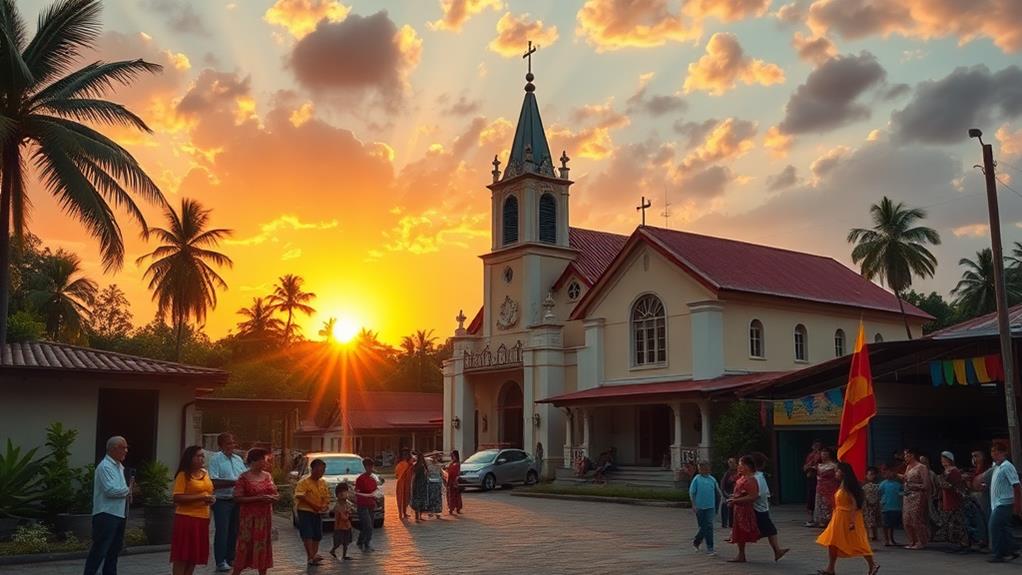
Catholicism's Profound Impact on Filipino Society
Catholicism plays a vital role in shaping the social fabric of the Philippines, influencing daily interactions, national celebrations, and moral values. Over 80% of the population identifies as Roman Catholic, making its teachings an integral part of Filipino values and morality.
The Catholic Church's Active Role in Community Life
The Catholic Church goes beyond spiritual guidance, actively participating in community life. Parish priests often become key figures in governance and social services, shaping moral frameworks through their teachings and community initiatives.
This involvement reinforces the importance of family, respect, and community solidarity, which are core values rooted in Catholic doctrine.
Catholicism's Influence on Cultural Practices
Catholicism's impact is evident in cultural practices, such as festivals like Christmas and Holy Week. These celebrations manifest Catholic values, creating a collective identity.
The blending of indigenous beliefs with Catholicism also results in a unique syncretism, influencing moral decision-making and social interactions.
Evolving Influence of Catholicism Among Younger Generations
However, younger generations are selectively adhering to Catholic teachings, posing challenges for the Church as it navigates contemporary moral dilemmas and societal changes.
While Catholicism continues to shape Filipino values, its influence is evolving, reflecting the dynamic nature of society.
Current Religious Dynamics
The religious landscape in the Philippines has become increasingly complex. This complexity is reflected in the coexistence of diverse beliefs alongside the traditional dominance of the Catholic Church.
Over 80% of the population identifies as religious, but smaller sects and fundamentalist groups are gaining traction, challenging established norms and reshaping community values.
The low priest-to-people ratio in the Catholic Church has led to decreased community engagement. In response, the Church is adapting by fostering grassroots movements and encouraging native clergy to address local challenges.
The Catholic Church's social action initiatives often put it at odds with government authorities. This friction showcases the Church's commitment to human rights and social justice.
This enduring influence on Filipino morality is evident even as new religious movements rise.
Interfaith dialogues are emerging, indicating a growing willingness to collaborate across diverse beliefs. These dialogues aim to tackle pressing socio-political issues.
In this evolving landscape, religious dynamics are deeply intertwined with the values and moral fabric of Filipino society, creating a rich dialogue between tradition and modernity.
Syncretism in Filipino Culture
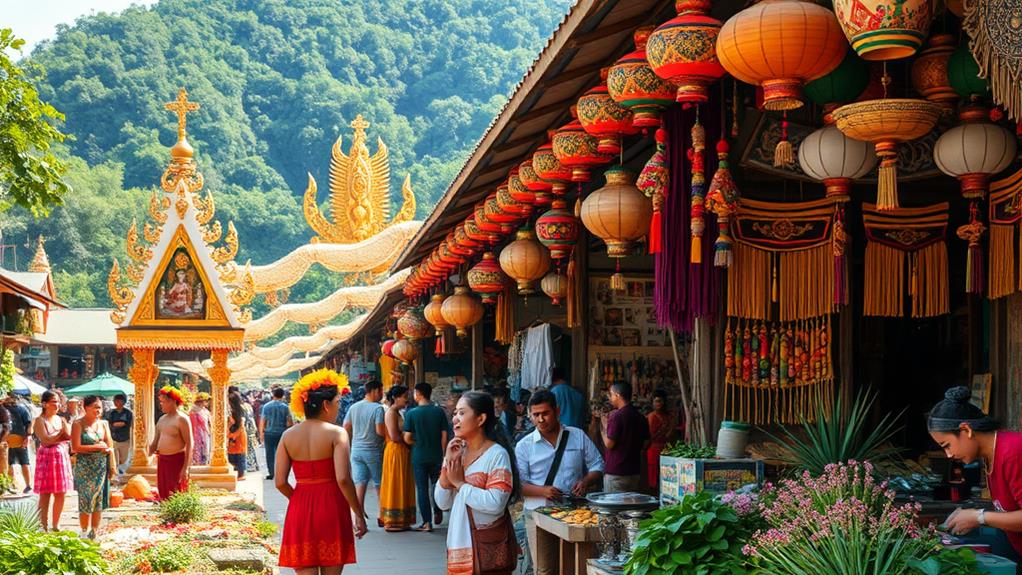
Filipino Culture: A Blend of Beliefs
Filipino culture is a unique blend of traditional practices and Catholic doctrines. This syncretism is evident in religious celebrations, such as Sinulog and Ati-Atihan, where indigenous rites and Catholic imagery coexist harmoniously, showcasing shared cultural values.
In rural areas, folk Christianity thrives, as many Filipinos combine animistic beliefs with their Catholic faith. Rituals honoring both local deities and saints are common, creating a distinct spiritual identity that reflects the heart of Filipino culture.
The Aglipayan Church, established during the Philippine revolution, is an example of how syncretism shapes religious expression and identity, allowing Filipinos to assert their national pride alongside their faith.
Today, grassroots movements continue to evolve, blending traditional values with modern interpretations of Catholicism. This dynamic landscape fosters a rich diversity in belief systems, demonstrating that Filipino culture is a living testament to resilience and adaptability.
Through syncretism, Filipino spirituality isn't just about adhering to one doctrine, but rather an intricate dance of faith and tradition that continues to thrive.
Moral Frameworks in Daily Life
Filipino spirituality, shaped by the blend of traditional beliefs and Catholic teachings, significantly influences daily moral frameworks. This unique blend of religiosity and cultural values prioritizes family, respect, and community.
The concept of kapwa, which translates to "shared identity," reinforces communal bonds by recognizing that an individual's identity is interconnected with others. For example, in Filipino culture, addressing older individuals with respect titles such as "Tito" or "Tita" emphasizes the importance of shared identity and respect for elders.
Celebrations and rituals serve as expressions of collective moral values, such as the Fiesta ng Santa Cruz, which celebrates the town's patron saint and reinforces communal bonds.
The practice of padrino, or godparenthood, highlights the importance of reciprocity and moral obligations. For instance, a godparent is expected to provide guidance and support to their godchild, demonstrating the value of mutual responsibility.
These moral values not only dictate personal behavior but also guide community interactions.
When faced with dilemmas, Filipinos often recontextualize Catholic teachings to resonate with their specific circumstances. The influence of collective standards is palpable, as the community's expectations shape decisions and actions.
This interconnectedness fosters a harmonious social environment, where ethical behavior is a shared commitment.
Youth Engagement With Faith
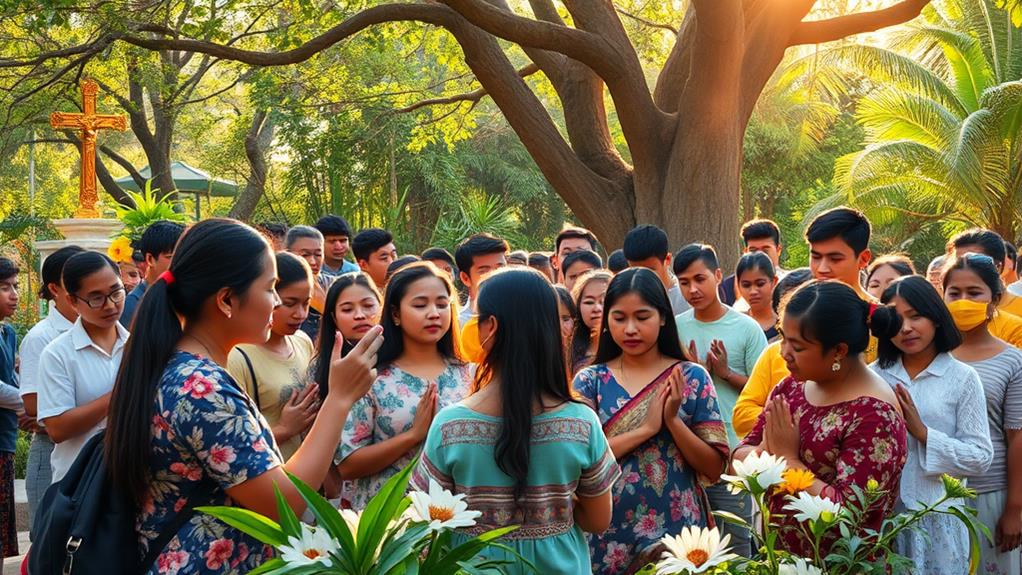
Youth Engagement with Faith in the Philippines
In the Philippines, over 80% of youth identify as religious, and faith plays a significant role in shaping their personal and communal identities. Prayer is an essential tool for many young Filipinos, guiding them in decision-making and personal development.
Faith isn't just about rituals; it's a dynamic force that helps navigate life's complexities.
Catholic Life Formation initiatives have raised environmental awareness among young Filipinos, demonstrating how faith can merge with social responsibility. However, many youth display selective adherence to Catholic teachings, indicating a complex relationship with faith. This may involve negotiating traditional beliefs with modern challenges, seeking relevance in their spiritual journey.
Engagement with spirituality often leads to deeper personal relationships with God, reinforcing the notion that faith is integral to personal development.
The Catholic Church needs to adapt its strategies to resonate with contemporary issues faced by young Filipinos. By addressing these challenges, the Church can enhance youth involvement and foster a more meaningful connection with their faith.
In this evolving landscape, youth engagement with faith is about crafting a relevant identity that balances tradition with modernity.
Socio-Political Challenges
The Philippines' socio-political landscape is shaped by the complex interplay between religion and politics.
The historical introduction of Islam and Christianity has led to enduring socio-political tensions, particularly in Mindanao, where Muslim populations resist the dominance of Catholicism.
Discrimination against Muslim Filipinos continues to marginalize them within a predominantly Catholic nation. This marginalization hinders their socio-political participation and contributes to feelings of exclusion.
The 1996 peace agreement aimed to address these grievances, but its implementation reveals complexities in achieving lasting peace. For instance, the agreement's goals of autonomy and self-governance for Muslim regions have been slow to materialize, leading to ongoing unrest.
Grassroots movements challenge traditional religious authority, demanding a reevaluation of religion's role in socio-political issues. These movements push for change and inclusivity, complicating the socio-political landscape further.
The Catholic Church's involvement in social justice often clashes with government authorities, revealing an ongoing struggle between governance and religious moral teachings.
As a result, the intersection of faith and politics continues to shape Filipino values and morality, often leading to both conflict and collaboration in the quest for social justice.
How Does Animism Affect Filipino Values and Morality Compared to Other Religions?
The influence of animism on filipino culture can be seen in the strong connection to nature and ancestors. This belief system shapes values and morality, emphasizing respect for the environment and the spirits around them. Compared to other religions, animism fosters a unique perspective on the interconnectedness of all living things.
Community and Cultural Traditions
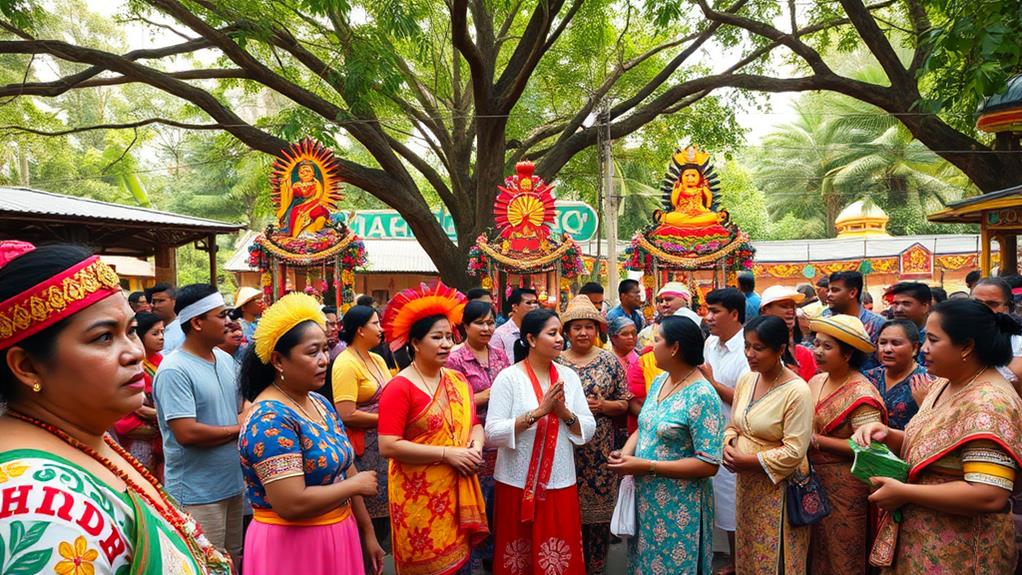
Community life in the Philippines is deeply rooted in cultural traditions and Catholic teachings. These traditions shape daily interactions and define social structures within communities. For example, wakes and memorials demonstrate a profound respect for the deceased, emphasizing the importance of family bonds that are central to Filipino culture.
The padrino system is a prime example of how Catholic ritual kinship integrates into social governance, fostering relationships and networks of reciprocity. This highlights the importance of community support.
Cultural celebrations often intertwine with religious observances, showcasing collective moral beliefs in action and reinforcing community solidarity through shared values.
Filipino spirituality is a blend of indigenous beliefs and Catholic doctrines, as seen in practices like honoring the dead and participating in festivals. However, the influence of religious iconography in everyday life raises concerns about the integrity of these cultural traditions.
The commercialization of sacred symbols can challenge their role in shaping moral values.
The intertwining of community and cultural traditions with Catholicism significantly influences the Filipino way of life, creating a unique and dynamic social fabric.
Future of Religion and Morality
Filipino Morality is Undergoing a Shift
A significant change is taking place in the moral landscape of the Philippines, driven by younger generations questioning traditional values. Over 80% of Filipinos still identify as religious, but many young people are becoming non-religious or less observant.
This Shift is Manifesting in Various Ways
- Growing numbers of youth identifying as non-religious or less observant: This trend is evident in the increasing number of young Filipinos who no longer identify with a particular religion or attend religious services regularly.
- Increased interfaith dialogues promoting moral understanding among diverse groups: Organizations and educational institutions are hosting interfaith dialogues to promote understanding and respect among people of different religious backgrounds.
- Educational institutions integrating moral education into curricula: Schools are incorporating moral education into their curricula to teach students about different ethical perspectives and values.
Globalization and Technology are Challenging Established Beliefs
As globalization and technology expose people to diverse ethical viewpoints, the challenge to established beliefs becomes more pronounced. This has made moral education crucial in fostering ethical development that reflects contemporary societal norms.
The Church's Response will Play a Significant Role
The Church's response to pressing social issues, such as environmental concerns and social justice, will play a significant role in its relevance moving forward.
The Church must adapt to the changing landscape of Filipino values to remain relevant.
Embracing Interfaith Dialogues is Vital
Embracing interfaith dialogues will be vital in building a moral framework that resonates with the changing landscape of Filipino values.
Questions and Answers
How Does Religion Affect Moral Values?
Religion influences moral values by providing a spiritual foundation for decision-making. Through religious teachings, individuals develop ethical frameworks that guide their actions and behaviors.
For instance, many religions emphasize the importance of honesty, encouraging followers to be truthful in their interactions with others.
Religion fosters community cohesion, promoting a sense of shared responsibility. When individuals engage with their faith, they become part of a community that reinforces positive behaviors and choices.
This community support system helps individuals uphold moral principles, such as responsibility, and cultivates a sense of belonging among its members.
How Does Religion Affect Philippine Society or Culture?
Religion plays a significant role in shaping Philippine society and culture. This is evident in the numerous vibrant religious festivals that take place throughout the year, which foster community cohesion by bringing people together in shared beliefs and traditions.
For instance, the Sinulog Festival in Cebu and the MassKara Festival in Bacolod are two popular examples of such events. These festivals not only enhance social ties but also reinforce cultural identity.
Religious institutions also provide ethical teachings that guide daily interactions, promoting values such as respect, compassion, and kindness. These teachings are reflected in the way Filipinos interact with each other, particularly in their strong emphasis on family values and respect for authority.
In the Philippines, family is considered the basic unit of society, and religious teachings reinforce the importance of family ties and respect for elders.
Religion's influence is also seen in community engagement, where many religious organizations are involved in various social and charitable activities. This is evident in the many Catholic Church-led initiatives that provide education, healthcare, and other social services to marginalized communities.
How Does Religion Influence Your Beliefs and Values?
Religion shapes your beliefs and values through its teachings and practices. These spiritual practices influence your worldview and often intertwine with communal traditions. For instance, many religions emphasize the importance of respect and family, which are reflected in their teachings and customs.
The influence of your community plays a significant role in shaping your values. As you engage with your religious community, you're more likely to adopt values that align with shared religious teachings. This is because your community reinforces these values through shared practices and discussions.
Engaging in religious practices strengthens your connection to your faith and community. By participating in spiritual practices, you cultivate a sense of belonging and moral guidance.
This connection is reinforced as you engage with your community, leading to a deeper understanding of your faith and its values.
What Is Faith and Religiosity in Filipino Values?
Faith and religiosity are essential components of Filipino values. These values are deeply rooted in daily life, influencing various aspects of Filipino culture and society.
Attending Mass and engaging in prayer are common spiritual practices that strengthen one's connection to tradition and cultural heritage. For example, many Filipinos attend Sunday Mass as a way to express their faith and spend time with family.
Cultural traditions often reflect religious beliefs, emphasizing the importance of family bonds and community respect.
Participating in these rituals reinforces values that shape one's identity and moral framework within society. For instance, the Filipino tradition of Simbang Gabi, a series of nine dawn Masses leading up to Christmas, is a way to honor one's spirituality and reinforce family bonds.